M
U
S
I
C
J. Thomas Brown
U
S
I
C
J. Thomas Brown
J. Thomas Brown
Colorblind

Josh Brown’s debut EP Colorblind introduces listeners to the gentle, searching, and intelligent world that is Brown’s music. Tracks like “Color Blind” and “Dead Weight” carry an upbeat tempo that drive the narrative, and resonate throughout the record. While tracks like “Classically Gone” and “All of the Above” wander down long sunlit roads, and return with quiet, deeper understandings. The four tracks that make up Brown’s Colorblind EP each tell a part of the tale; from a listless wanderer who searches for change across hazy urban landscapes, to a reveler who clings to the last rays of hope from days gone past, to the discovery of silver-lining’s when things fall apart, and finally, to the reflective musings of an arduous life well lived. This is Brown’s world, thoughtfully crafted and served neat. At times a hazy world of buzzed confusion, and at others, a clear, hangoverless morning.
Find out how Brown wrote and recorded his long expected EP, his monk-like process of finding precisely the right lyric, and what comes from the self-doubt induced process of recording and sharing music below ︎︎︎
Have you gotten a good response from the EP so far?
Pretty good response so far. Some people have said more particular things about the recordings than it was nice or good job. They’ve made comparisons to bands that I like or commented on the diversity of the songs which is something that I really strove for. You don't want to write the same songs over and over again. Also, people said that the songs have a particular sound to myself, that it doesn’t feel too influenced by this or that. So that's been good.
What other music have you put out before?
I have actually never put anything out. I've sent songs to people I’m close to and shared in that way.
How long did it take for you to finish these songs?
I would say the oldest song is Classically Gone, which is probably close to four years old. And Colorblind is two years old. Colorblind and All of the Above came together around the same time, and Dead Weight came together in the end.
How did it all come together right now?
Two years ago I started the project and booked the time, and I felt that the songs were getting too old and that I needed to fulfill this. It wasn’t enough for me to keep recording songs on my fourtrack and sharing them with my friends. I wanted to do it the right way. The structure of setting the date, hiring the person, engineering it, and getting the musicians there to play the part, was all very helpful and motivating.
My friend Tommy Garcia helped me with recording this EP. I met him because Ditches (Tim Donnelly’s band that Josh plays guitar for) used to open for his band Mrs. Magician. I had reached out to one other person that I knew through work but he wasn’t very responsive. He wasn’t that interested in doing it. I sent the recordings to Tommy, and he totally got it and loved Classically Gone. He told me what we could do, and that it didn’t have to be too high production, that we could still maintain the integrity of the style of music, but do it in a way that was listenable.
Pretty good response so far. Some people have said more particular things about the recordings than it was nice or good job. They’ve made comparisons to bands that I like or commented on the diversity of the songs which is something that I really strove for. You don't want to write the same songs over and over again. Also, people said that the songs have a particular sound to myself, that it doesn’t feel too influenced by this or that. So that's been good.
What other music have you put out before?
I have actually never put anything out. I've sent songs to people I’m close to and shared in that way.
How long did it take for you to finish these songs?
I would say the oldest song is Classically Gone, which is probably close to four years old. And Colorblind is two years old. Colorblind and All of the Above came together around the same time, and Dead Weight came together in the end.
How did it all come together right now?
Two years ago I started the project and booked the time, and I felt that the songs were getting too old and that I needed to fulfill this. It wasn’t enough for me to keep recording songs on my fourtrack and sharing them with my friends. I wanted to do it the right way. The structure of setting the date, hiring the person, engineering it, and getting the musicians there to play the part, was all very helpful and motivating.
My friend Tommy Garcia helped me with recording this EP. I met him because Ditches (Tim Donnelly’s band that Josh plays guitar for) used to open for his band Mrs. Magician. I had reached out to one other person that I knew through work but he wasn’t very responsive. He wasn’t that interested in doing it. I sent the recordings to Tommy, and he totally got it and loved Classically Gone. He told me what we could do, and that it didn’t have to be too high production, that we could still maintain the integrity of the style of music, but do it in a way that was listenable.
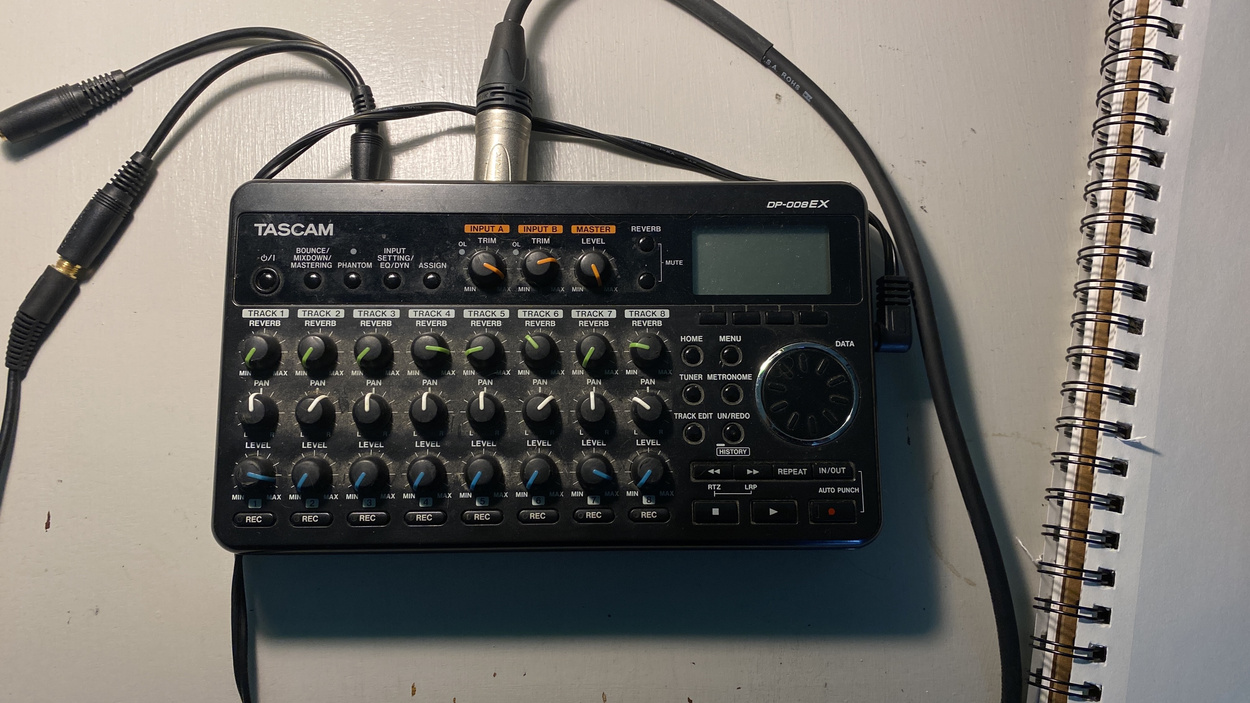
How did you remain excited about the songs for so long?
I feel like they are true, lyrically and sonically, to the best expression of what I feel like I have been able to do with music. They’ve gotten the best response from the friend group, but other than that I don’t know. Mostly for me they have always felt better than other songs that I’ve written.
But I definitely lost interest at times. At first I was really excited and I felt that I never knew these songs could sound this way, but then I hated them and felt embarrassed to put them out, and I didn’t want anyone to know that I wrote them. Laughs. And then I liked them again.
What is the recording process like?
We recorded the rhythm at Big Fish studio in Rancho Santa Fe. It’s an old studio built in the 1980’s. They have Neumann’s (vintage microphones) from the Beatles era there that you can use, and a lot of things are broken so you have to figure out which channels on the board work and which condensers are still working. But it has a certain feeling about it that is special. This was a deal I got through Tommy.
Basically, I sat in an isolated room and did scratch and vocal tracks while they played drums and bass until we got it pretty close. Scratch means we’re not using it, so the only purpose of me being in that room is that we can get the separate guitar, drums, and bass recorded. We got that in one day and recorded live.
After that, we went to Tommy’s studio in La Mesa which is called Sunsick. Sunsick is a studio he has one other partner with and that’s where we did everything else. We recorded strings there, which was done by Tim McNally, and Tim Donnelly wrote a lot of the guitar parts but he wasn’t the one who played them. Andrew Ware (Monarch) played drums and Chris McIntyre played bass. The engineer Tommy himself played some synth. We did about four sessions there and then we did a few after for mixing.
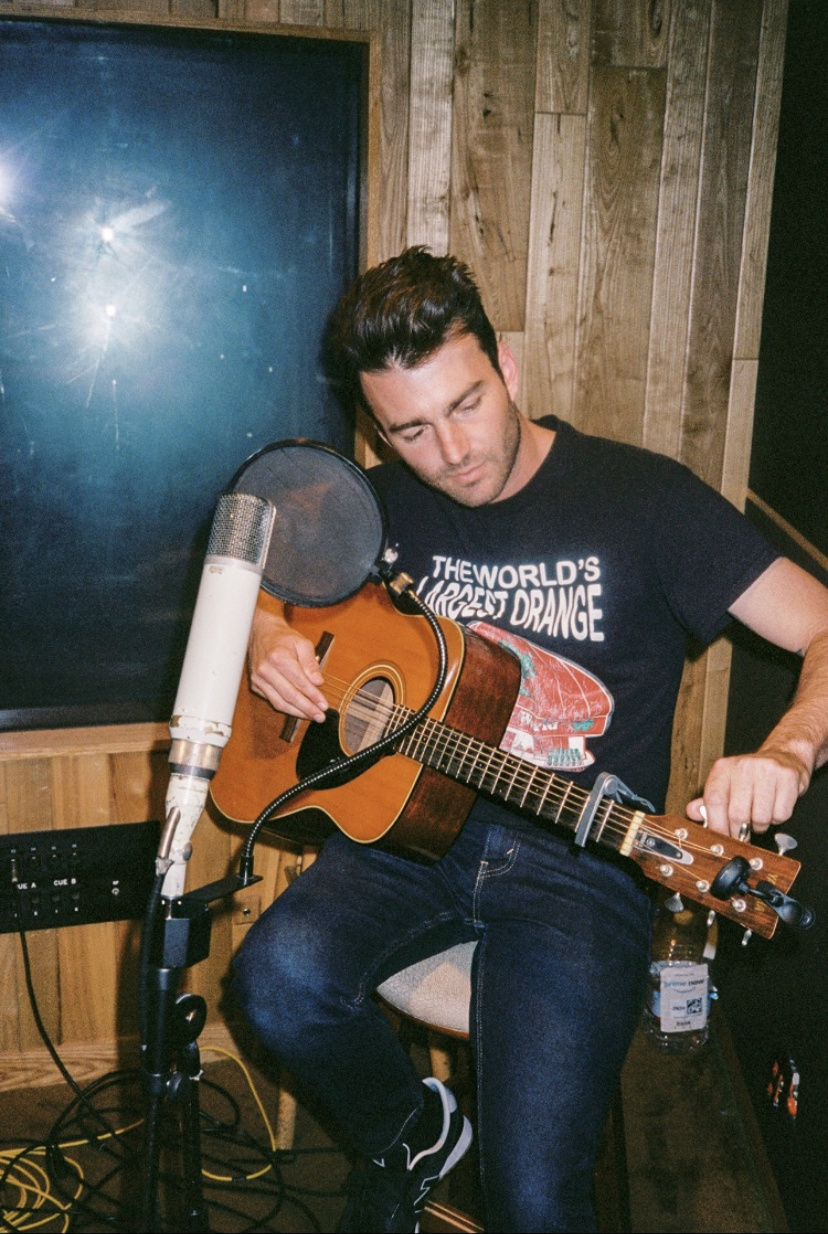
Photo by Cameron Holland
Did this take a couple of months, or was this at the tail end of everything coming together?
After we recorded the rhythm at Big Fish there was some time in between, a month or a little longer, and then we were at Tommy’s studio pretty frequently, but there would be months and months in between until we got together again to mix, and then even since then it’s been a year.
That is an extensive process. What sort of challenges did you guys face?
Well, for instance on Colorblind the rhythm got messed up in the beginning and that’s why there is no rhythm section, until it comes in later. In terms of really taking our time and thinking about how it was going to work, that was put to the side. I was really excited to get in the studio, and I was actually really comfortable with Tommy. Whereas before with other people I felt rushed, and I felt self-conscious. But with Tommy I felt that he understood it, and that he had a vision for it. We rushed certain little things, but for the most part it was relaxed and mostly thoughtful. He really was my guide, which I’m grateful for.
Has recording this record helped you grow either as a musician or a person? Getting this record out, finishing it…
Yeah, forsure. I feel like psychologically I came a long way in terms of accepting that these are the songs, that this is a version of the song that we are going to put out. There is no going back. I can’t rewrite this part or write a different lyric, or change the instrumentation. This is what’s being put out. I need to accept that and I like it enough to do that.
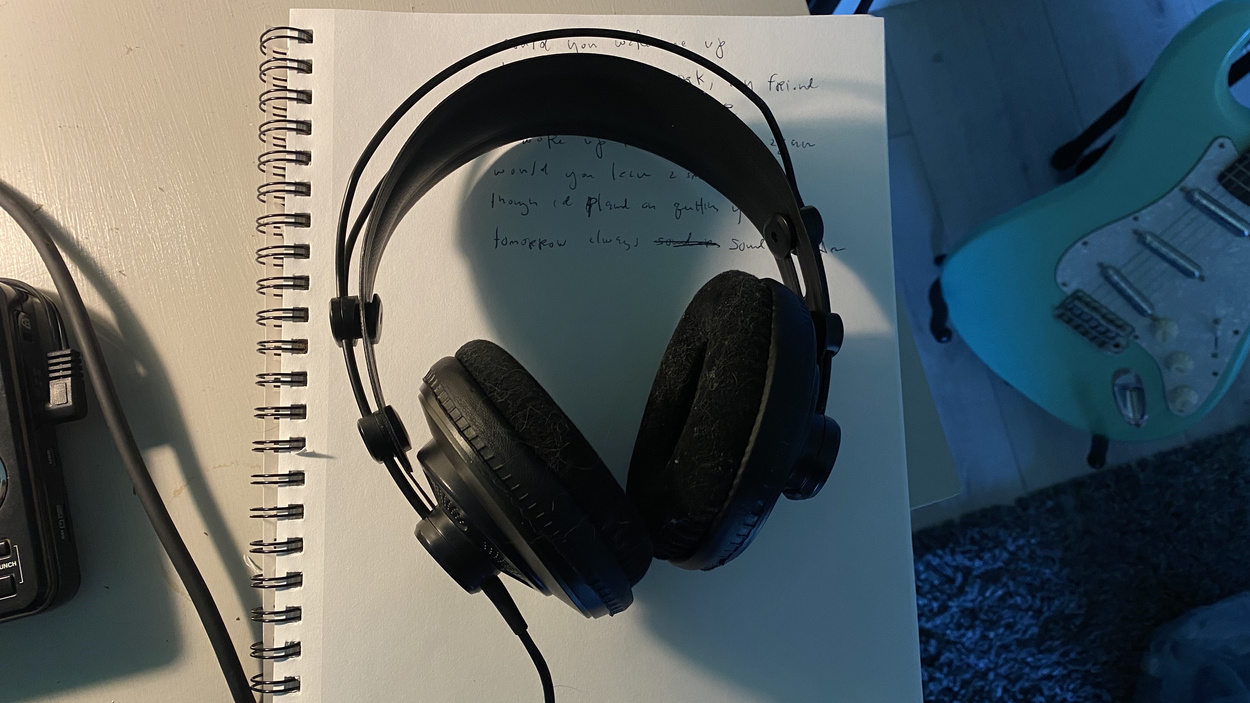
What sort of influences went into the record?
I would say certain people and certain times in my life. I think most of the songs are not true to one event, but a collection of lyrics written at certain times that somehow get pieced together to make sense. A lot of the lyrics used in the songs were even older than the songs are. Sometimes you have one lyric that you like a lot that you can’t place in a story. Years down line it may fall into place and fill in the blank.
But there were musical influences for me as well, like the Beatles, Chad Van Gaelenn, Cut Worms, Elliot Smith, and Cass McCombs. I just try to take the best qualities from each group that I’m influenced by and try to interject it or put it in my own way. Whether it’s a vocal harmony or a noise, a feedback. It could be anything.
How do you write a lyric, where does it come from?
It’s very random. A lot of it is observation, a lot of it is reflection. I would say melody is more important, and the words are hard. It’s difficult all around. It is not usually a very comfortable process. But I would say sitting around, playing guitar and trying to think of lyrics is nice for me, like playing a crossword. But then what comes after, forming the structure, finding the changes, writing the words, and trying to make them good is the uncomfortable part.
Do you imagine playing these songs live, or a band/solo act coming from it in the future?
I don’t love playing live. I would much rather be a recording artist than a performer, but if I could find a way that I felt translated then I would do it. And I plan to work on that.
What’s your ideal setting?
Probably an amphitheater. Laughs. Probably a stadium. No, I’m not really sure. I guess wherever people would understand it and enjoy it. I don’t really care if it’s a living room, a house party, or a Soda Bar kind of place.
That would be fun, we should definitely have a house party show.
Our friends have enough bands, we could definitely do that.
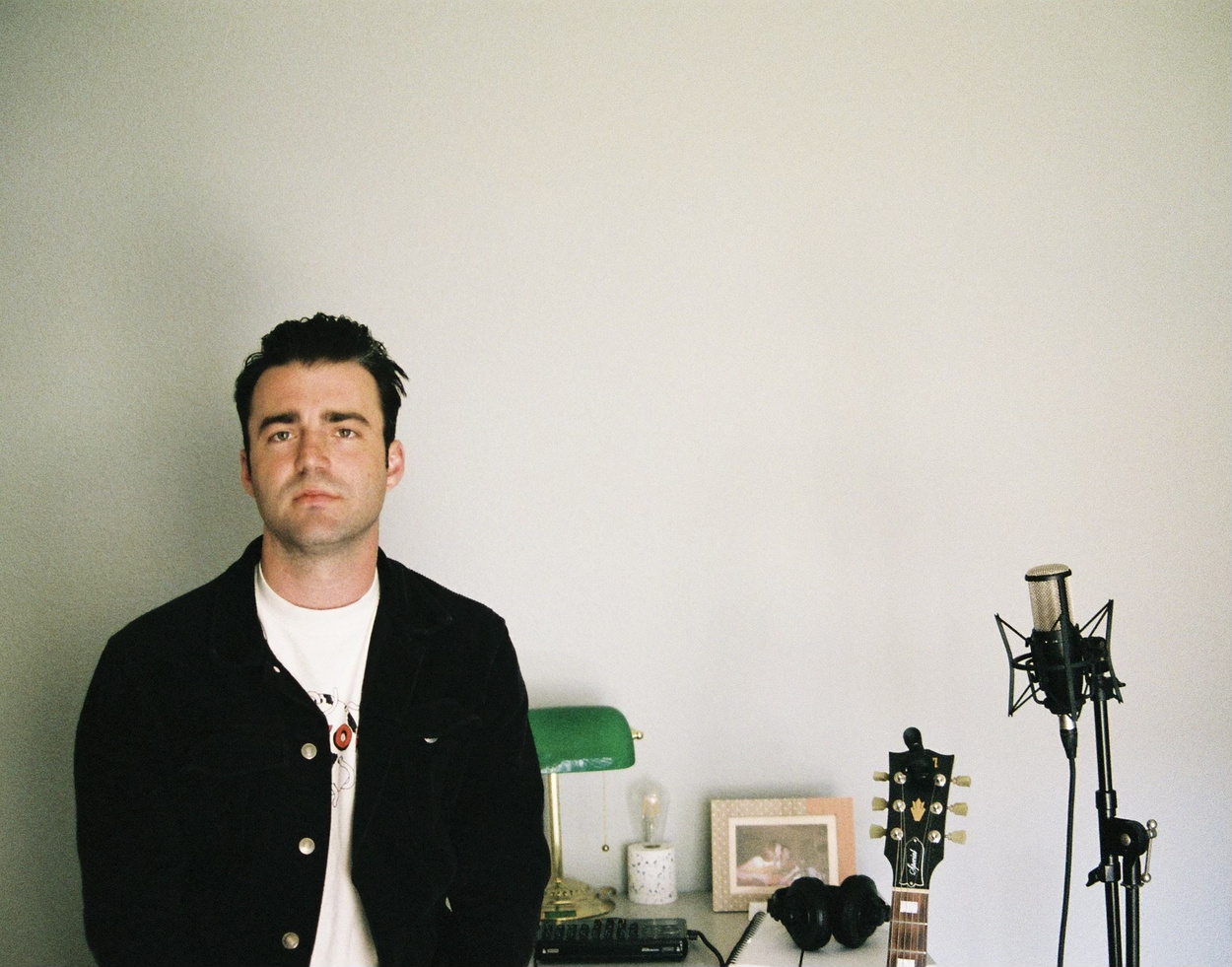
What sort of themes/ideas are at work in your songs?
The songs are about confusion, and the act of being able to sum up that confusion, or whatever the feeling may be. It is about making a statement about that one part of yourself, and that being enough to get through it. It doesn’t matter whether it has healed properly, but if you make a statement about it then you can move on from it in a way. You’re organizing a feeling. Nothing has to be a big story. I think that once you’ve figured something out there is a lot less to say about it.
Interesting. That sounds like the artistic process itself. This ability to capture and relate a feeling, and that this process has certain qualities about it that are helpful for growth or understanding.
Exactly.
Since this is the first music you’ve put out into the world, do you think you’ve succeeded? In finding your voice, your style?
I think I’ve had a style, and I think that I’ll continue to master it based on what elements I always enjoy in songs, lyrically and sonically. I definitely made my best effort at it. But succeeded? I’m not sure. I don’t know if anyone ever feels that way. But just being able to do it and make up my mind and get it out was really my goal.
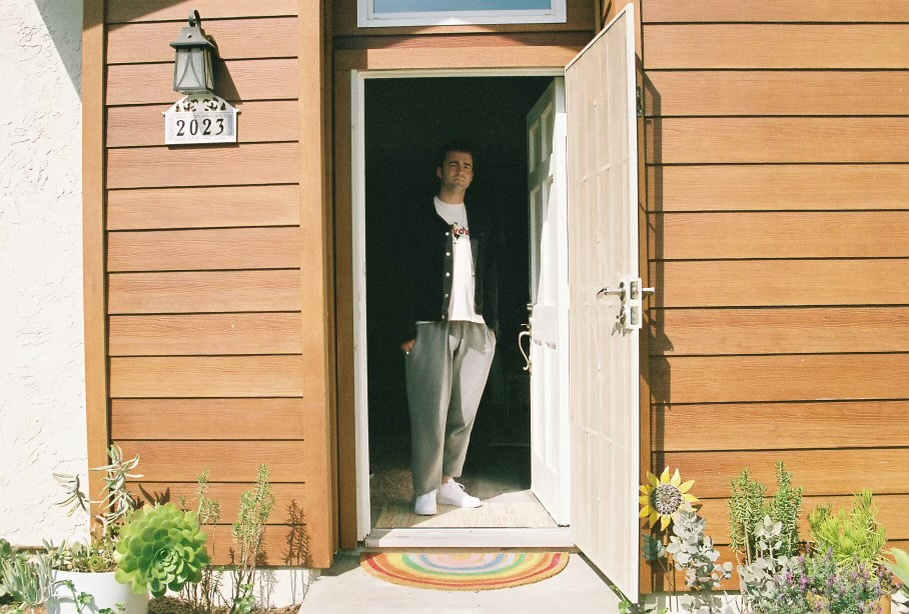
What is something you’ve taken away from recording and releasing an EP?
That it’s not that complicated. It isn’t intimidating to me anymore, and I realize that people are going to like it or they’re not, and that music is something that I’m going to do anyway, that I have to do. It’s my only interest, really. Regardless of how it’s received or where it goes, I’ll continue to write and record music and put money into it and do my best at it.
What advice do you have for the youth out there, people trying to do what you’ve done?
Laughs. I would say you just gotta do it. Whatever you’re hung up about, just get over it. Because it’s a waste of energy to think about doing something, and not do it, if it’s something you really want to do.
Well, I really enjoy all of the songs. Thank you Josh!
Thank you!